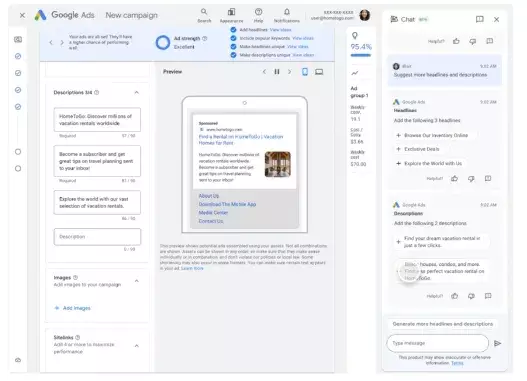The digital marketing landscape is ever-evolving, and Google’s latest suite of AI enhancements for Google Ads marks a significant step forward in how businesses engage with their audiences. Unveiled at DMEXCO, Europe’s premier digital marketing expo, these developments promise to redefine advertising efficiency and effectiveness, leveraging advanced artificial intelligence to streamline campaign management.
Google’s introduction of advanced AI tools goes beyond a simple update; it signifies an expansion of capabilities that enhance user experience. Initially launched in English, the AI ad building tools are now set to be available in multiple languages, including German, French, and Spanish. This multilingual functionality allows advertisers from diverse backgrounds to take advantage of AI technology, ensuring their campaigns are not just effective in English-speaking countries but also in major European markets. The AI-driven approach simplifies the creation of promotional content: by entering a URL, businesses can have the AI generate tailored descriptions, relevant keywords, catchy headlines, and engaging images. This seamless setup can reduce the time and effort traditionally required to launch successful ad campaigns.
Another noteworthy update is the expansion of Google’s AI image editing capabilities. Initially restricted to Performance Max campaigns, these tools will now be available across various types of campaigns, including Search, Demand Generation, App, and Display ads. This broadens the applicability of AI in creating visually appealing content, allowing brands to maintain consistency and quality across different advertising formats. Furthermore, advertisers can now provide multiple reference images along with prompts to generate unique product and promotional visuals. This feature enhances creativity while maintaining brand integrity, enabling marketers to adapt their visual strategy swiftly and effectively.
The introduction of asset coverage reporting in Performance Max campaigns signifies a crucial advancement for advertisers seeking to optimize their strategies. By identifying underperforming asset groups, businesses will now receive specific recommendations on how to enhance them — suggestions such as adding additional long headlines or incorporating more images provide actionable insights. This data-driven approach shifts the focus from guesswork to informed decision-making, allowing for continuous improvement and better alignment of ads to audience needs.
Moreover, the rollout of campaign-level negative keywords within Performance Max campaigns adds another layer of precision. By enabling advertisers to exclude specific keywords at the campaign level, Google is granting businesses greater control over their ad dissemination, which is essential for maintaining brand reputation and ensuring that advertising funds are utilized effectively.
While skepticism always surrounds new technologies, the real potential of Google’s AI lies in its ability to create and optimize advertising assets by learning from vast pools of performance data. Unlike many social media applications where generative AI serves primarily as a novelty, Google’s asset generation tools promise tangible value by directly impacting advertising effectiveness. This focus on performance enhancement showcases how generative AI can drive successful brand strategies rather than simply providing flashy visual effects.
As advertisers become more reliant on data-backed insights, the continuous refinement of these AI tools will allow businesses to develop campaigns informed by real-world performance metrics. The capacity for AI to aid in crafting effective advertising strategies will likely establish a competitive edge for brands looking to resonate with their consumers.
Google’s ambitious AI updates in Google Ads underscore the increasing importance of artificial intelligence in shaping the future of digital marketing. With features designed to simplify ad creation, enhance image generation, and provide robust analytics, businesses now have the tools to craft highly targeted and effective advertising strategies. As these AI capabilities expand and evolve, advertisers will need to adapt to this transformative landscape to leverage the full potential of AI in driving engagement and conversions.
These advancements not only highlight Google’s commitment to innovation in digital marketing but also pave the way for a more data-driven, efficient advertising ecosystem where brands can connect with consumers more effectively than ever before.

